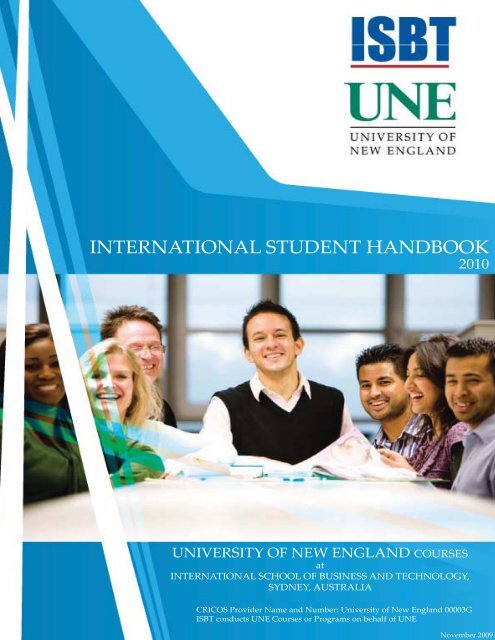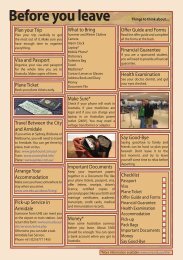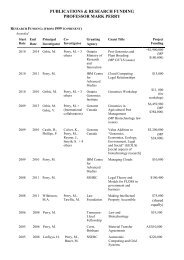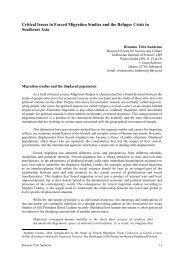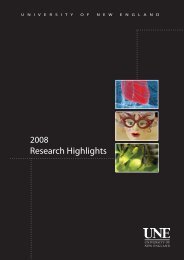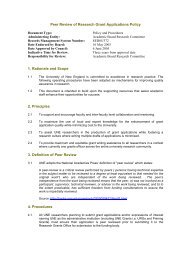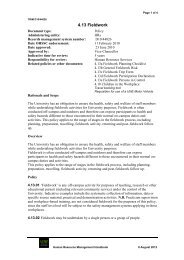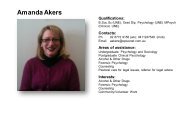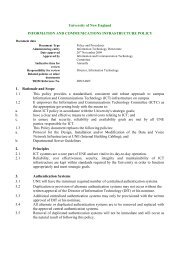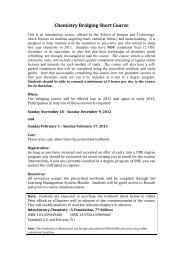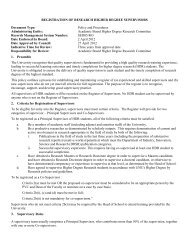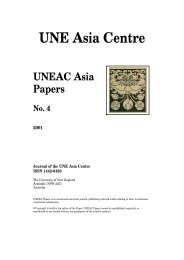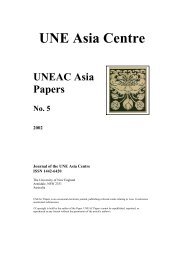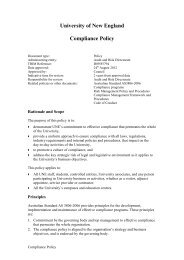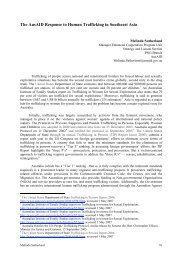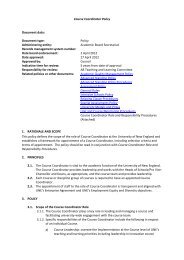International Student Handbook - University of New England
International Student Handbook - University of New England
International Student Handbook - University of New England
You also want an ePaper? Increase the reach of your titles
YUMPU automatically turns print PDFs into web optimized ePapers that Google loves.
INTERNATIONAL STUDENT HANDBOOK<br />
2010<br />
UNIVERSITY OF NEW ENGLAND COURSES<br />
at<br />
INTERNATIONAL SCHOOL OF BUSINESS AND TECHNOLOGY,<br />
SYDNEY, AUSTRALIA<br />
CRICOS Provider Name and Number: <strong>University</strong> <strong>of</strong> <strong>New</strong> <strong>England</strong> 00003G<br />
ISBT conducts UNE Courses or Programs on behalf <strong>of</strong> UNE<br />
November 2009
Contents<br />
WELCOME 3<br />
SECTION 1: ARRIVAL IN AUSTRALIA 4<br />
IMPORTANT CONTACT DETAILS 4<br />
PRINCIPAL DATES: ISBT SYDNEY 5<br />
STUDENT SERVICES 10<br />
Counselling service 10<br />
Learning Assistance Lecturer 10<br />
IT Helpdesk 11<br />
Unit Lecturers 11<br />
Librarian 11<br />
UNE Program Director 11<br />
Campus Manager 11<br />
<strong>International</strong> Services (UNE) 11<br />
Academic Skills Office (UNE) 11<br />
Equity Office (UNE) 12<br />
TECHNOLOGY – COMPUTER & INTERNET ACCESS 12<br />
Your UNE Account 12<br />
Computer Labs 12<br />
Printing 12<br />
ACCOMMODATION AND TRANSPORT 13<br />
ACCOMMODATION 13<br />
Renting In Sydney 13<br />
Finding a place to rent 13<br />
Your legal rights and responsibilities as a tenant 14<br />
The Share House Option 14<br />
Homestay 14<br />
Public Transport 14<br />
Airport Link 14<br />
Buses 15<br />
Trains: Interstate and Intrastate Services 15<br />
Ferries 15<br />
Light Rail 16<br />
Monorail 16<br />
Taxis 16<br />
Driving in Australia 16<br />
BANKING 17<br />
Australian Banks 17<br />
Opening a bank account 17<br />
Banking Facilities Close to ISBT 17<br />
Transferring Money to Australia 18<br />
<strong>International</strong> Money Transfer 18<br />
Travellers‟ Cheques 19<br />
Automatic Teller Machines (ATMs) 19<br />
Exchange Rate Issues 19<br />
UNE-ISBT 2009-2010 <strong>International</strong> <strong>Student</strong> <strong>Handbook</strong> Page 1
COMMUNICATIONS 20<br />
Phoning Home 20<br />
Home Phone (Landline) 20<br />
Pre-paid Mobile Phone Services 20<br />
Mobile Phone Contracts 21<br />
Internet Access 21<br />
Phone and Internet Contracts 21<br />
COPING WITH LIFE IN AUSTRALIA 22<br />
Homesickness 22<br />
Safety 23<br />
SECTION 2: STUDYING @ ISBT 27<br />
FACILITIES 27<br />
Teaching 27<br />
Library 27<br />
Academic and English language support 27<br />
<strong>Student</strong> lounge and recreation 28<br />
First Aid and Medical 28<br />
Course advice and enrolment assistance 28<br />
Course accreditation 28<br />
Highly qualified academic staff and small class sizes 28<br />
ENROLMENT AND COURSE PROGRESS 29<br />
Subject changes after enrolment 26<br />
Advanced standing / recognition <strong>of</strong> prior learning 26<br />
Fast-track study opportunity 26<br />
Deferring, suspending and cancelling enrolment 26<br />
Assessment 26<br />
Examination results 27<br />
Graduation 27<br />
ACADEMIC INFORMATION 27<br />
Attendance and Course progress 27<br />
Academic Progress 27<br />
Consulting tutors and lecturers 28<br />
Assessment 28<br />
Time management 29<br />
Plagiarism 29<br />
YOUR RESPONSIBILITIES 30<br />
Contact details 30<br />
Academic 30<br />
Administrative 30<br />
PROBLEMS? 30<br />
<strong>Student</strong> Rights 30<br />
Appeals, Complaints and Grievance Procedures 31<br />
SECTION 3: IMPORTANT INFORMATION 32<br />
VISA CONDITIONS 32<br />
MEDICAL SERVICES 33<br />
DOCTORS 33<br />
Hospital 34<br />
Pharmaceuticals/ Prescriptions 34<br />
TAX FILE NUMBER 34<br />
NATIONAL CODE 34<br />
UNE-ISBT 2009-2010 <strong>International</strong> <strong>Student</strong> <strong>Handbook</strong> Page 2
Welcome<br />
We are pleased to welcome you to study at the <strong>International</strong> School <strong>of</strong> Business and Technology (ISBT)<br />
and the <strong>University</strong> <strong>of</strong> <strong>New</strong> <strong>England</strong> (UNE). This <strong>Handbook</strong> provides academic and administrative<br />
information to support and help you enjoy your studies and your time in Australia.<br />
ISBT staff are your first point <strong>of</strong> contact for enquires ranging from enrolment procedures to English<br />
language and academic assistance, visa conditions and other help and advice. If you have any<br />
difficulties, all staff are here to help overcome them.<br />
Your lecturers are well qualified in their field and can advise on academic matters and information<br />
relating to the units they teach such as assignments and exam preparation.<br />
There is also a UNE-based course coordinator for each unit. They are responsible for the creation <strong>of</strong><br />
the unit materials, the moderation <strong>of</strong> all assessment tasks, the resolution <strong>of</strong> issues brought to their<br />
attention by ISBT lecturers, and the finalisation <strong>of</strong> unit grades.<br />
As a student <strong>of</strong> ISBT and UNE you also have responsibilities. These include advising ISBT staff <strong>of</strong> your<br />
Australian address within 7 days <strong>of</strong> arrival in Australia and advising staff <strong>of</strong> any changes to your<br />
address and contact details during your stay. You also need to understand your visa conditions.<br />
We look forward to helping ensure you have every chance at success in your studies, and hope that<br />
you enjoy your time with ISBT and UNE while in Australia.<br />
VERNON CREW<br />
Director<br />
English Language and <strong>International</strong> Services<br />
<strong>University</strong> <strong>of</strong> <strong>New</strong> <strong>England</strong><br />
KISHORE VALLAM<br />
CEO<br />
<strong>International</strong> School <strong>of</strong> Business<br />
and Technology<br />
UNE-ISBT 2009-2010 <strong>International</strong> <strong>Student</strong> <strong>Handbook</strong> Page 3
Section 1:<br />
Arrival in Australia<br />
Important Contact Details<br />
For Help<br />
Contact<br />
In an emergency Police/Fire/Ambulance Telephone 000<br />
Using this handbook ISBT <strong>Student</strong> Services Staff Telephone 02 92621280<br />
Enrolling online Orientation Week, UNE And ISBT Staff Telephone 02 92621280<br />
Using online services Orientation Week, ISBT Helpdesk Telephone 02 92621280<br />
Personal problems ISBT Counselling Service Telephone 02 92621280<br />
Campus Manager Telephone 02 92621280<br />
Lifeline<br />
Telephone 13 11 14<br />
(Free Telephone Counselling Service)<br />
Accommodation ISBT <strong>Student</strong> Services Staff Telephone 02 92621280<br />
Language and learning ISBT Learning Assistance Lecturer Telephone 02 92621280<br />
Academic concerns Campus Manager Telephone 02 92621280<br />
Visa ISBT <strong>Student</strong> Services Staff Telephone 02 92621280<br />
<strong>International</strong> Services Manager, UNE Telephone 02 6773 3361<br />
DIAC (Department <strong>of</strong> Immigration and<br />
Citizenship)<br />
Telephone 131 881<br />
Medical Nearest Medical Centre Address / Phone Telephone 02 92619200<br />
Child care<br />
Sydney Medical Centre, Shop M1 (on the<br />
Mezzanine Level), 580 George St, Sydney<br />
ISBT <strong>Student</strong> Services Staff Telephone 02 92621280<br />
Security ISBT <strong>Student</strong> Services Staff Telephone 02 92621280<br />
Legal concerns ISBT <strong>Student</strong> Services Staff Telephone 02 92621280<br />
<strong>International</strong> Services Manager, UNE Telephone 02 6773 3361<br />
Financial issues Campus Manager Telephone 02 92621280<br />
Sydney Campus<br />
<strong>Student</strong> Services<br />
Tele: + 61 2 9262 1280<br />
Fax: + 61 2 9262 1238<br />
E-mail:<br />
info@isbt.nsw.edu.au<br />
www.isbt.nsw.edu.au<br />
UNE Campus<br />
<strong>International</strong> Services<br />
Tele: 02 6773 3192<br />
Fax: 02 6773 3325<br />
E-mail:<br />
ioserv@une.edu.au<br />
www.une.edu.au<br />
UNE-ISBT 2009-2010 <strong>International</strong> <strong>Student</strong> <strong>Handbook</strong> Page 4
Principal Dates: ISBT Sydney<br />
UNE-ISBT 2009-2010 <strong>International</strong> <strong>Student</strong> <strong>Handbook</strong> Page 5
UNE-ISBT 2009-2010 <strong>International</strong> <strong>Student</strong> <strong>Handbook</strong> Page 6
UNE-ISBT 2009-2010 <strong>International</strong> <strong>Student</strong> <strong>Handbook</strong> Page 7
Teaching Calendar 2010-2011<br />
UNE-ISBT 2009-2010 <strong>International</strong> <strong>Student</strong> <strong>Handbook</strong> Page 8
Teaching Calendar 2011<br />
UNE-ISBT 2009-2010 <strong>International</strong> <strong>Student</strong> <strong>Handbook</strong> Page 9
<strong>Student</strong> Services<br />
ISBT <strong>Student</strong> Services has a front counter where you can ask<br />
any questions. If you have questions about your study, visas,<br />
health cover, or life in Sydney, come and see us.<br />
Staff can:<br />
o Advise/counsel<br />
o Provide accurate information on visa regulations for<br />
student visa holders<br />
o Provide information concerning life in Sydney<br />
o Help manage financial problems<br />
o Provide one-on-one support to individual students in<br />
crisis<br />
o Monitor academic progress and provide necessary<br />
support<br />
o Provide pre-arrival information<br />
o Provide request letters, sign <strong>of</strong>ficial documents and<br />
perform other administrative tasks<br />
Social activities program<br />
<strong>Student</strong> Services runs a diverse social activities program each teaching period, which will give you a<br />
chance to see some wonderful scenery and sights, and some insight into lifestyle in Australia. These<br />
include weekends or one day trips to various interesting locations in Sydney, the beautiful Blue<br />
Mountains or the beaches and seaside towns <strong>of</strong> the South Coast. There will be information about social<br />
activities during orientation, and also on student notice boards throughout the teaching period.<br />
Counselling service<br />
If you need assistance with any sort <strong>of</strong> difficulty, such as adjusting to a new environment and country, or<br />
understanding different ways <strong>of</strong> studying, ISBT Counsellors can help you. Counsellors can also help you<br />
with difficult personal situations such as a financial problem or illness in the family, and will also advocate<br />
on behalf <strong>of</strong> students. ISBT counselling service is free, confidential and voluntary.<br />
UNE <strong>Student</strong> Assist staff and the <strong>International</strong> Services Manager at UNE in Armidale are also available for<br />
help and support via email and telephone. Further information about UNE <strong>Student</strong> Assist and UNE<br />
<strong>International</strong> Services can be found at: http://www.une.edu.au/elis/<br />
UNE-ISBT 2009-2010 <strong>International</strong> <strong>Student</strong> <strong>Handbook</strong> Page 10
Learning Assistance Lecturer<br />
Assists with study, time management, and English language. Study skills classes are arranged once every<br />
week and individual appointments can be made.<br />
IT Helpdesk<br />
Provides help with computers in the computer lab and organises all your printing requirements.<br />
Unit Lecturers<br />
Teach classes; provide information and assistance with assessments and exams.<br />
Librarian<br />
Assists in finding books, locating journals online, and accessing the UNE library.<br />
UNE Program Director<br />
James Hunter is UNE‟s senior<br />
academic staff member<br />
who oversees all academic<br />
issues, course progress and<br />
liaises with ISBT Lecturers and<br />
UNE Unit Coordinators.<br />
Please contact ISBT <strong>Student</strong><br />
Administration should you<br />
need to meet with him.<br />
Campus Manager<br />
Warren Obst is the ISBT<br />
Sydney Campus Manager.<br />
He will be available to<br />
address both issues and concerns that ISBT <strong>Student</strong> Administration staff are unable to. Please contact<br />
<strong>Student</strong> Administration should you need to meet with him.<br />
<strong>International</strong> Services (UNE)<br />
You should talk to ISBT staff first for advice about visa conditions and changes to enrolment. UNE‟s<br />
<strong>International</strong> Services (IS) <strong>of</strong>fice is situated on the <strong>University</strong>‟s main campus in Armidale. Staff members<br />
are available to assist <strong>International</strong> students, and may be contacted by phone or email.<br />
Tel: 02 6773 3192<br />
Email: ioserv@une.edu.au Web: http://www.une.edu.au/elis/<br />
Academic Skills Office (UNE)<br />
Location:<br />
Reception Level 8,<br />
301 George Street<br />
Sydney 2000<br />
Call:<br />
Ext 1280<br />
For all enquiries<br />
Call:<br />
Ext 1280<br />
For all enquiries<br />
Office Hours:<br />
Monday to Friday: (9am – 5pm)<br />
CLOSED on Saturday, Sunday<br />
and Public Holidays<br />
UNE‟s Academic Skills Office is available to all students <strong>of</strong> the <strong>University</strong>. It has a webpage with<br />
information including how to study well, academic writing and reading and oral presentations.<br />
Academic Skills advisors <strong>of</strong>fer individual consultations to all students at the <strong>University</strong>, via phone, fax,<br />
email or online.<br />
Tel: 02 6773 3600<br />
E-mail: asohelp@une.edu.au Web: http://www.une.edu.au/tlc/aso<br />
UNE-ISBT 2009-2010 <strong>International</strong> <strong>Student</strong> <strong>Handbook</strong> Page 11
Equity Office (UNE)<br />
The Equity Office based at the <strong>University</strong> can assist you if you believe you are being harassed or<br />
unfairly treated by staff or other students. Racial vilification and sexual harassment are illegal in<br />
Australia and the Equity Office can inform you <strong>of</strong> your rights and responsibilities in this regard. You<br />
should first talk to staff at ISBT or the UNE Program Director.<br />
Tel: 02 6773 2897<br />
Email: studentequity@une.edu.au Web: http://www.une.edu.au/eeo<br />
Technology – Computer & Internet Access<br />
Your UNE Account<br />
As an UNE-ISBT student you are able to obtain access to the UNE computer network and other IT services.<br />
You are able to register for your account as soon as your enrolment has been processed and your<br />
enrolment period has started. Please visit the UNE online registration page and follow the prompts on<br />
the page to register. Once you submit your online request, your account will be available to you in<br />
about two hours. This will give you access to the internet, online teaching resources, library resources<br />
and email. <strong>Student</strong> Services can assist you with registering.<br />
http://www.une.edu.au/it-services/students/student-getstarted/index.php<br />
Computer Labs<br />
Three computer labs with 15 – 20 computers in each are available for academic purposes such as<br />
assignment preparation, research or other study. You may also use these for checking email. All<br />
computers have fast internet connection and the latest Micros<strong>of</strong>t products.<br />
Printing<br />
Printers are available just outside the computer labs.<br />
Your printer card will be issued at enrolment. Please<br />
note a fee is charged for printing.<br />
UNE-ISBT 2009-2010 <strong>International</strong> <strong>Student</strong> <strong>Handbook</strong> Page 12
Accommodation and Transport<br />
Accommodation<br />
If you have not organised accommodation in Australia, please contact ISBT staff immediately. The<br />
beginning <strong>of</strong> each term is a very busy time and accommodation may take a little longer to find during<br />
these periods<br />
There are several options for accommodation, including rental, shared house or apartment and<br />
homestay. Most international students prefer to share rental accommodation to reduce costs.<br />
Remember that finding the right style <strong>of</strong> accommodation for your needs is very important – the success<br />
<strong>of</strong> your studies largely depends upon it. Ask yourself before you commit yourself:<br />
o<br />
o<br />
o<br />
o<br />
o<br />
Do I want to live alone, with other students, or an Australian family?<br />
Do I need to be close to public transport?<br />
Is parking a priority?<br />
How much can I really afford to pay in rent?<br />
Do I want the financial and physical responsibility <strong>of</strong> running my own home?<br />
Renting In Sydney<br />
Renting is an attractive option for many students. It provides you with a degree <strong>of</strong> stability and the<br />
option <strong>of</strong> taking in other students to help you with the rent if required.<br />
Finding a place to rent<br />
1. Check the local papers on Saturdays<br />
2. Check the rental information on the student noticeboard<br />
3. Use the internet – there are many good sites available such as www.realestate.com.au<br />
UNE-ISBT 2009-2010 <strong>International</strong> <strong>Student</strong> <strong>Handbook</strong> Page 13
Your legal rights and responsibilities as a tenant<br />
Tenants NSW is a useful website providing information on your rights and responsibilities as a tenant in<br />
<strong>New</strong> South Wales and keeping up with the latest news about rental housing in Sydney. There are many<br />
Tenancy Fact Sheets covering topics such as starting a tenancy, bond, boarders & lodgers,<br />
sharehousing, repairs, how to give notice, etc. They also <strong>of</strong>fer a free advisory service.<br />
Tele: 02 9698 5975<br />
NSW Office <strong>of</strong> Fair Trading publishes "The Renting Guide” which provides information on your basic rights<br />
and responsibilities as a tenant from beginning through to ending a tenancy, how to get repairs done,<br />
privacy and what to do if you have a problem. A copy <strong>of</strong> The Renting Guide is available from <strong>Student</strong><br />
Services or online<br />
www.fairtrading.nsw.gov.au/About_us/Publications/Property_and_tenancy/ftr66therentingguide.html<br />
The Share House Option<br />
"The Share Housing Survival Guide" www.rlc.org.au/sharehousing/intro.html is a great resource for<br />
people thinking about living in share accommodation. It provides information ranging from how to go<br />
about looking for a place, what to consider when meeting prospective housemates, how to set up a<br />
house, what you can expect it will cost you, what your legal rights and responsibilities are, and things to<br />
consider to ensure things go smoothly.<br />
ISBT <strong>Student</strong> Services are also happy to talk to you about living in share accommodation.<br />
Homestay<br />
Homestay with an Australian family who provide accommodation and meals is also a good option for<br />
international students. The approximate cost <strong>of</strong> Homestay is between AUD$250 to AUD$290 per week.<br />
ISBT <strong>Student</strong> Services keeps a list <strong>of</strong> Homestay providers to assist students in making necessary<br />
arrangements.<br />
Public Transport<br />
Airport Link<br />
This rail service runs from approximately 5am until Midnight seven days a week, to and from the<br />
Domestic and <strong>International</strong> Terminals and all City Circle railway stations. For more information, call 02<br />
8337 8412 or visit www.airportlink.com.au.<br />
For timetables and trip planning, call 131 500 or visit www.131500.info.<br />
UNE-ISBT 2009-2010 <strong>International</strong> <strong>Student</strong> <strong>Handbook</strong> Page 14
Buses<br />
Sydney Buses operates an extensive network <strong>of</strong> bus services throughout the city. The main bus terminals<br />
are located at Circular Quay, Wynyard, Town Hall and Central Station.<br />
Information about Sydney Bus services is available from:<br />
Bus kiosks at Circular Quay<br />
Wynyard Station<br />
Queen Victoria Building (QVB) and<br />
Railway Square (Central Station)<br />
Sydney Transport Infoline: www.131500.info Tel:131 500<br />
Sydney Buses website:www.sydneybuses.info.<br />
Trains: Metropolitan Services<br />
CityRail has a large range <strong>of</strong> leisure and tourist tickets to get you where you want to go. You can travel<br />
around the City centre on the City Circle Line (Circular Quay, Wynyard, Town Hall, Central, Museum and<br />
St James Stations). There is also a station at Martin Place. Ticket vending machines are open 24 hours.<br />
Information about CityRail services is available from Circular Quay and Central Stations.<br />
The City Hopper Train provides unlimited all day rail travel in the area bounded by Kings Cross, North<br />
Sydney and Redfern.<br />
Sydney Transport Infoline: www.131500.info Tel: 131 500<br />
City Rail website: www.cityrail.info.<br />
Trains: Interstate and Intrastate Services<br />
Central Railway Station is the main junction for interstate and intrastate rail services. Information about<br />
these services is available from:<br />
Train kiosks at Central Station<br />
Sydney Transport Infoline: www.131500.info Tel: 131 500<br />
Countrylink Infoline: www.countrylink.info Tel: 132 232.<br />
Ferries<br />
One <strong>of</strong> the most delightful ways to make your way to and from the City is to take a ferry on Sydney<br />
Harbour. Information about ferry services is available from:<br />
Ferry kiosks at Circular Quay and Manly<br />
Sydney Transport Infoline: www.131500.info Tel: 131 500<br />
Sydney Ferries website: www.sydneyferries.info.<br />
UNE-ISBT 2009-2010 <strong>International</strong> <strong>Student</strong> <strong>Handbook</strong> Page 15
Light Rail<br />
Metro Light Rail is Sydney's newest transport system. Modern trams run from historic Central Station<br />
through vibrant Chinatown and Darling Harbour to the Star City Casino, the Sydney Fish Markets and<br />
Wentworth Park 24 hours a day, seven days a week. Information about services is available from:<br />
Metro Light Rail Infoline<br />
02 9285 5600<br />
www.metrolightrail.com.au<br />
Monorail<br />
The monorail has a fabulous city loop with eight stops throughout the CBD. The monorail leaves every 3-<br />
5 minutes and takes approximately 15 minutes to do the circuit. Single trips or day passes can be<br />
purchased at every station. Information about services is available from:<br />
Monorail Infoline<br />
02 8584 5288<br />
www.metromonorail.com.au<br />
Taxis<br />
There is an abundance <strong>of</strong> taxis that can be hailed from the street, or engaged at ranks at Circular Quay,<br />
Wynyard Station, and Town Hall Station.<br />
Driving in Australia<br />
You are advised to take an Australian driving test if you intend to drive while you are here. A guide to<br />
road rules is available from the Roads and Traffic Authority (RTA) www.rta.nsw.gov.au . We also advise<br />
before you start driving in Australia to take some lessons to familiarise yourself with local driving<br />
conditions and road laws. Road laws include:<br />
o<br />
o<br />
o<br />
Driving on the left-hand side <strong>of</strong> the road; this applies to all states in Australia<br />
All occupants in a car, including passengers, must wear seatbelts.<br />
„Drink Driving‟ – ie. driving when over the legal blood alcohol limit – can result in heavy fines<br />
or even loss <strong>of</strong> licence (including an overseas licence)<br />
You may drive on a valid overseas licence indefinitely while holding a student or temporary visa,<br />
provided the licence is either in English or is accompanied by an <strong>of</strong>ficial English translation (eg. an<br />
<strong>International</strong> Driving Permit). An <strong>International</strong> Driving Permit is a translation <strong>of</strong> a driver licence; it is not a<br />
licence itself. For your <strong>International</strong> Driving Permit to be valid, you must also carry your overseas licence<br />
when driving.<br />
UNE-ISBT 2009-2010 <strong>International</strong> <strong>Student</strong> <strong>Handbook</strong> Page 16
Banking<br />
(www.studymove.com/content/view/79/31/)<br />
Most <strong>of</strong> the major banks in Australia <strong>of</strong>fer full time students various banking options including low fees,<br />
hassle free banking, no monthly account fees or withdrawal fees. It is best to visit a bank that is located<br />
close to ISBT, because they have more experience with international students and can better meet<br />
your banking needs.<br />
The major banks in Australia include:<br />
Australian Banks<br />
Commonwealth Bank<br />
Westpac Bank<br />
St George Bank<br />
Citibank<br />
National Australia Bank<br />
ANZ Bank<br />
HSBC<br />
Some states and territories have established banks which also<br />
<strong>of</strong>fer students tailored banking services.<br />
Most banks are open from 9am to 5pm from Monday to Friday. Some bank branches may open on<br />
Saturdays but it is best to look on their website for their opening times.<br />
The best way to do banking in Australia is via the internet as you will have access to your account 24<br />
hours a day, 7 days a week.<br />
You can also do banking over the phone and most bank telephone enquiry lines are open from 8am –<br />
8pm, Monday to Friday.<br />
Opening a bank account<br />
The process <strong>of</strong> opening a bank account in Australia is quite simple. Firstly, we recommend you research<br />
the services and fees provided by the main banks.<br />
You should visit their websites to obtain more information on fees, services provided and the number <strong>of</strong><br />
ATMs they have. Most <strong>of</strong> the banks provide a preferential fee to students. Some major banks allow you<br />
to open a bank account before you travel to Australia, alternatively, you can open an account when<br />
you arrive in Australia by visiting any branch.<br />
To be able to open a bank account, you will need to present your passport and a document to prove<br />
that you have enrolled at an education institution (this could be your student ID).<br />
Banking Facilities Close to ISBT<br />
Alll the major banks have branches within 2-3 minutes walk from the campus. A map <strong>of</strong> bank locations<br />
is available from <strong>Student</strong> Services.<br />
UNE-ISBT 2009-2010 <strong>International</strong> <strong>Student</strong> <strong>Handbook</strong> Page 17
Transferring Money to Australia<br />
According to the experience <strong>of</strong> many international students we suggest you explore the following<br />
options:<br />
a) international money transfer,<br />
b) using travellers cheques or<br />
c) with Automatic Teller Machines (ATM´s).<br />
<strong>International</strong> Money Transfer<br />
There are three common ways <strong>of</strong> making an international money transfer. We recommend that you<br />
research each option and decide which one is better for you.<br />
You can use:<br />
a) a money transfer service provider eg. Western Union;<br />
b) postal <strong>of</strong>fices eg. Australia Post http://www.auspost.com.au ; and<br />
c) banks.<br />
Possibly the cheapest and most secure method to get your money from overseas is through a bank<br />
transfer. For this, you first need a bank account in Australia. After you open your bank account in<br />
Australia, you will be able to arrange an <strong>International</strong> Money Transfer (IMT).<br />
Your overseas bank will need some information to make an <strong>International</strong> Money Transfer (IMT). You<br />
have to visit the branch in Australia where you opened your new account and explain that you are<br />
interested in making an IMT from overseas. They will provide you with the following information:<br />
a) complete name <strong>of</strong> the bank;<br />
b) branch name and code; and<br />
c) your account number.<br />
In addition, they will provide you with a code and other information for your bank in your home country.<br />
After you obtain this information contact your home bank or ask someone in your home country to<br />
contact the bank. The bank in your home country will request the information provided by the<br />
Australian bank to complete the IMT. Some banks charge a small fee to make this transfer. The transfer<br />
usually takes 3 business days to 2 weeks to be completed.<br />
Please talk directly with your chosen bank about this process and the fees they charge before making<br />
a final decision on how you will transfer your money. In general, banks in Australia understand this<br />
process very well and you will find their services helpful.<br />
UNE-ISBT 2009-2010 <strong>International</strong> <strong>Student</strong> <strong>Handbook</strong> Page 18
Travellers’ Cheques<br />
We highly recommend bringing Travellers‟ Cheques to Australia to reduce the risk <strong>of</strong> lost or stolen cash.<br />
They are a safe alternative to bringing large amounts <strong>of</strong> cash with you and you will be protected<br />
against the inconvenience <strong>of</strong> losing cash. Most <strong>of</strong> the banks and exchange agencies in Australia<br />
change US Travellers‟ Cheques for Australian Dollars. You can also now purchase Travellers‟ Cheques in<br />
Australian Dollars.<br />
Automatic Teller Machines (ATMs)<br />
Some international students prefer to keep their bank account open in their home country and<br />
withdrawal money from an ATM in Australia. You can do this from almost any ATM in Australia.<br />
This is a very easy way access your money, though you need to be aware that most <strong>of</strong> the banks<br />
charge an extra fee for this service. Sometimes, this fee is quite high. In addition you should check the<br />
exchange rates for withdrawing cash from an ATM in Australia. It is best to check these fees with your<br />
local bank.<br />
You also need to check the daily withdrawal limit established by your bank. Usually in Australia you can<br />
only get around $400 dollars from an ATM per day. However, this may vary between banks.<br />
Exchange Rate Issues<br />
It is very important to consider possible changes in the exchange rate. Even though the Australian dollar<br />
has been very stable in recent years it is best to plan ahead to avoid complications.<br />
Some students prefer to get their money in one transfer to avoid future changes in the exchange rate<br />
and as a result plan and budget for their stay in Australia. The way you manage your finances is a<br />
personal decision and one we cannot advise you on. We recommend you talk to your financial adviser<br />
or a bank representative to gain advice regarding these issues.<br />
We also suggest having different money exchange plans according to different levels <strong>of</strong> the exchange<br />
rate to evaluate how much you will get when you convert your local currency into Australian dollars. For<br />
more information on this you can visit our section on budgets.<br />
UNE-ISBT 2009-2010 <strong>International</strong> <strong>Student</strong> <strong>Handbook</strong> Page 19
Communications<br />
Phoning Home<br />
Major Australian Phone<br />
Companies<br />
Home Phone (Landline)<br />
You can arrange connection through any <strong>of</strong> the<br />
Australian phone companies listed to the right.<br />
There are many companies <strong>of</strong>fering a range <strong>of</strong> 'phone<br />
plans' and prices. It may be a good idea to shop around<br />
to compare prices and conditions. However, as a guide<br />
you can expect to pay some or all <strong>of</strong> the charges listed<br />
below:<br />
www.telstra.com<br />
www.optus.com.au<br />
www.vodafone.com.au<br />
www.aapt.com.au<br />
www.soulaustralia.com.au<br />
Connection Fee: $60 fee if the phone line exists and<br />
phone handset is at the property or a $210<br />
connection/reconnection <strong>of</strong> phone line.<br />
Call charges: From a home phone, local calls range from 18c to 30c per call (unlimited time), from public<br />
phones calls cost 40c/50c. STD (long distance) & ISD (international) calls vary considerably from company<br />
to company.<br />
Other charges and billing: A standard handset is approximately $30.00, with a monthly rental charge <strong>of</strong><br />
$3. Monthly rental <strong>of</strong> the phone line is around $18.50.<br />
Bills will be posted to you on a monthly basis. They will itemise STD & ISD calls and will include information<br />
about how to pay them.<br />
(all costs shown are subject to change)<br />
Pre-paid Mobile Phone Services<br />
For students pre-paid mobile phone services are a good alternative to mobile phone contracts in the<br />
short-term. When you buy a pre-paid mobile phone service you must give certain information to the<br />
mobile phone service provider before you can use your phone. You must show either one <strong>of</strong> the<br />
Category A documents listed OR two <strong>of</strong> the listed Category B documents. These documents must be<br />
current.<br />
Category A<br />
o current student card issued by ISBT<br />
o licence or permit issued under Commonwealth, State or Territory law - for example, a driver's<br />
licence<br />
o passport<br />
o birth certificate<br />
Category B<br />
o credit, debit or ATM card (with your name and signature)<br />
o passbook from a bank issued in your name<br />
o recent fixed network telephone bill issued in the last 12 months showing the name and<br />
address you have given the service provider<br />
o local council rates statement issued in the last 12 months showing the name and address you<br />
have given the service provider.<br />
UNE-ISBT 2009-2010 <strong>International</strong> <strong>Student</strong> <strong>Handbook</strong> Page 20
Mobile Phone Contracts<br />
Mobile phone service contracts are <strong>of</strong> a specified length, usually between 12 and 36 months. During<br />
this period you will receive connection to a network and, in many cases, the use <strong>of</strong> a handset and a<br />
certain number <strong>of</strong> free calls or text messages per month.<br />
It is important to think about how and when you will use your mobile before signing a contract. Other<br />
important things to ask before you make your choice include:<br />
o Can I meet the expected costs for the period <strong>of</strong> the contract?<br />
o Are there charges for ending my contract earlier?<br />
o Can I alter my contract if required?<br />
o Does the contract include a handset or do I have to provide my own?<br />
o What are the call rates once I exceed the $ value in my contract?<br />
For more information on mobile phone contracts contact go to www.acma.gov.au<br />
Internet Access<br />
Australia has over 800 internet service provider (ISP) to choose from providing overwhelming choice.<br />
However, the level <strong>of</strong> service and associated costs can vary considerably between providers.<br />
Consumer information guidelines for ISPs were developed by the Australian Communications and Media<br />
Authority (ACMA). These make your choice easier by asking ISPs to provide information in an easily<br />
comparable form. The guidelines group information under five main features:<br />
o price and billing;<br />
o performance;<br />
o help and installation;<br />
o communication; and<br />
o security <strong>of</strong> service.<br />
The guidelines also ask ISPs to provide information on any availability restrictions, billing arrangements,<br />
ancillary services and access for users with a disability.<br />
More information on internet costs is in the ACMA fact sheet „A guide to internet costs’. The guidelines<br />
are available at:<br />
http://www.acma.gov.au/WEB/STANDARD/pc=PC_17<br />
Remember……<br />
96<br />
Advertisements that suggest a product is<br />
'free' or a service is 'unlimited' are too good<br />
to be true.<br />
It is important to know the full cash<br />
price, the service costs and the<br />
limitations <strong>of</strong> <strong>of</strong>fers before making a<br />
decision.<br />
If in doubt, don‟t sign. Ask for help from<br />
one <strong>of</strong> ISBT‟s <strong>Student</strong> Services Officers.<br />
Phone and Internet Contracts<br />
In Australia, unless you purchase a phone card, you<br />
will be asked to sign a contract when you sign-up for a<br />
mobile phone, fixed line phone and the internet. This<br />
can be very confusing. To protect you, Australian laws<br />
ensure that you receive clear, correct and complete<br />
information and that the contracts are fair.<br />
Most companies use standard forms <strong>of</strong> agreement.<br />
However, these can still be complicated. To make it<br />
easier to understand the contract you should be given a summary <strong>of</strong> the terms and conditions. If one is<br />
not <strong>of</strong>fered, ask for one before you sign.<br />
More information contact:<br />
UNE-ISBT 2009-2010 <strong>International</strong> <strong>Student</strong> <strong>Handbook</strong> Page 21
Australian Communications and Media Authority E-mail sfoaregister@acma.gov.au.<br />
Telecommunications Industry Ombudsman Tele: 1800 062 058<br />
E-mail: tio@tio.com.au<br />
Coping with Life in Australia<br />
Homesickness<br />
When you come a great distance from another country adjusting to study and life might be difficult for<br />
you. You have to deal with a different language, strange food, a different climate and an unfamiliar<br />
landscape. And home is so far away; arranging to go home for a weekend is not a possibility for you.<br />
We have an idea <strong>of</strong> what it may be like for you, and are here to help. Be patient with us if our attempts<br />
to help seem odd in terms <strong>of</strong> your culture. The experience <strong>of</strong> moving into another culture is sometimes<br />
described as „culture shock‟.<br />
It is important to be aware <strong>of</strong> homesickness as a normal process which you may go through. It is a time<br />
<strong>of</strong> letting go. You are not alone in this experience – research shows that nearly 70% <strong>of</strong> students feel<br />
homesick at some time with most saying it lasted for 1 week and for others several weeks.<br />
Homesickness can include<br />
o Being miserable without knowing why<br />
o Feeling like a prisoner in your own room<br />
o Being unable to get into a comfortable routine<br />
o Not liking meals<br />
o Wondering what people at home are doing; feeling as if you are missing out<br />
o Wanting to go home straight after you have arrived<br />
o Not liking to come back after a holiday<br />
o Thinking you are the only person with homesick feelings<br />
o Being unable to settle into anything and crying for no reason<br />
o Finding the values <strong>of</strong> people around you strange and vaguely threatening<br />
o Getting fed up with new food, new smells, new scenery, and wanting the familiar<br />
Homesickness Survival Tips<br />
o Set your room up with something familiar from home<br />
o It is hard to let go <strong>of</strong> home, but ringing home too <strong>of</strong>ten in the first few weeks can prolong<br />
homesickness<br />
o Make an effort to talk to someone new and make the most <strong>of</strong> your time here<br />
o Get involved in activities<br />
o Talk to someone else about how you feel and make use <strong>of</strong> the support that is available here<br />
o Say yes to invitations from others to places or events where you will meet more people. If<br />
you are unsure about what to do or wear, ask.<br />
o If you have been involved in a religious or other group at home ask if there is one nearby<br />
o Be kind to yourself – it is OK to miss home and perfectly normal. After all, you have spent<br />
most <strong>of</strong> your life there until now, so tears can be cleansing.<br />
These suggestions may be all the help you need, but if your homesickness doesn‟t seem to be getting<br />
better or is interfering with your life or stopping you from getting into a new routine, please ask for help<br />
from the <strong>Student</strong> Services staff.<br />
UNE-ISBT 2009-2010 <strong>International</strong> <strong>Student</strong> <strong>Handbook</strong> Page 22
Important Safety Information<br />
Fire Safety<br />
Be prepared for an emergency:<br />
o Make sure your room/house has a smoke alarm<br />
o Test your smoke alarm to ensure it works (only<br />
possible if there is a test button)<br />
o This sound can save your life. It tells you there is<br />
danger from a fire in your room. NEVER stop<br />
your smoke alarm from working.<br />
o Too many people living in the one house can<br />
be unsafe<br />
o Do not use „double adaptors‟ or put too many<br />
plugs into an electrical outlet<br />
In case <strong>of</strong> fire, know:<br />
o Where your nearest fire exit is<br />
o How to use a fire extinguisher or hose reel<br />
o Where your evacuation meeting place is<br />
o Know/have an evacuation (escape) plan for your building<br />
o Do not use the lift/elevator except where there is a sign “May be used in an emergency”<br />
In a fire:<br />
o<br />
o<br />
o<br />
o<br />
o<br />
Get down on the floor<br />
Crawl to the door and get out <strong>of</strong> your room<br />
Close the door behind you – this prevents<br />
smoke and fire spreading<br />
Let others know there is a fire<br />
When outside STAY outside<br />
Police/Fire/Ambulance - (000)<br />
Use in an emergency and have your location<br />
(address) ready so you can be found<br />
Crime Stoppers – 1800 333 000<br />
Report crime anonymously<br />
Personal Safety and Crime Stopping Tips<br />
Police Assistance Line – 131 444<br />
o Be alert (look around), assertive (look like you<br />
know what you are doing) and be confident<br />
For non emergencies<br />
o Try and walk with other people rather than by yourself<br />
o Carry only the money you need for the day<br />
o Hold onto your things – your wallet, handbag phone. Don’t put things down and walk away or<br />
leave items that can be seen in your car – they could be stolen.<br />
o Keep your money and wallet in your front pocket and keep your bag in front <strong>of</strong> you<br />
o Be aware <strong>of</strong> things around you, avoid long talks on your mobile or SMS'ing while walking<br />
o At night stay in well lit areas where there are lots <strong>of</strong> people<br />
o If you feel like you are being followed or threatened, cross the street, change direction, vary<br />
your pace and enter a shop or occupied house<br />
If you are being robbed give them what they ask for; try and remember what they look like; and report<br />
all crimes to the Police (interpreter services are available).<br />
Swimming<br />
At the Beach<br />
Swim between the red and yellow flags (they mark the safest place to swim)<br />
Look at the safety signs to see if there are any dangers<br />
Always swim with a friend so you can watch out for each other<br />
If you get in trouble in the water – stay calm, put your hand up for help, try and float while<br />
waiting for help, and DON‟T swim against the current or rip<br />
Never swim at unpatrolled beaches<br />
UNE-ISBT 2009-2010 <strong>International</strong> <strong>Student</strong> <strong>Handbook</strong> Page 23
Never swim at night or before dawn<br />
Never swim under the influence <strong>of</strong> alcohol or drugs<br />
Never run and dive into the water<br />
Never swim directly after a meal<br />
Rivers or Lakes<br />
Check the water depth and temperature first and NEVER dive or jump into the water<br />
Be careful <strong>of</strong> hidden rocks and logs, and floating branches and other devris<br />
Beware <strong>of</strong> Too Much Sun<br />
Be sun safe at all times by putting on a hat and shirt while not swimming, wear sunglasses and<br />
always put on sunscreen.<br />
Home Safety<br />
House breaking is one <strong>of</strong> the most common crimes. Most house break-ins appear to be crimes <strong>of</strong><br />
opportunity with entry gained through an open or unlocked window or door. Most intruders are looking<br />
for a house left open or unlocked where they can get what they want with ease and make a quick<br />
getaway. Some general security tips for you:<br />
Your house number should be seen from the street in case <strong>of</strong> an emergency<br />
Keep your front door locked even while at home or in the back yard<br />
Do not leave messages on your front door as it lets people know you are away<br />
Avoid having packages delivered and left on your door step<br />
When out leave a radio or the TV on, or a light on in the evening to make it seem you are home<br />
Keep cash and valuables out <strong>of</strong> sight<br />
Contents Insurance<br />
It is recommended that you obtain Contents insurance for your belongings. Landlords will usually have<br />
House insurance but your belongings will not be covered. Contents insurance will replace your<br />
belongings if your house is robbed and your things are damaged or stolen, or you have a house fire<br />
and your belongings are destroyed or damaged. This may cost you up to $200 a year depending on<br />
the value <strong>of</strong> your belongings.<br />
Road Safety<br />
Road Rules<br />
If you are going to drive in Australia, no matter whether you are an experienced driver and have an<br />
international drivers‟ licence or not, YOU MUST KNOW THE ROAD RULES before you attempt to drive.<br />
Many lives are lost on Australian road every year and international visitors are at high risk. If you come<br />
from a country where you drive on the opposite side <strong>of</strong> the road to Australia it is sometimes helpful to<br />
have a companion drive with you to ensure you both take note <strong>of</strong> traffic conditions and signs until you<br />
are more familiar with driving. A hand tip is not to think <strong>of</strong> it as the other side <strong>of</strong> the road, but to think<br />
that the „white line‟ (or centre dividing line on the road) is on your side as the driver, just as it is in all<br />
countries. It is recommended that you take one or two driving lessons in Australia before you begin to<br />
drive here on your own.<br />
The major causes <strong>of</strong> serious road trauma are speeding, alcohol, driving when tired and not wearing a<br />
seat belt. Ensure you go to the Roads and Traffic website at www.rta.nsw.gov.au for more information.<br />
Speeding – is not just driving faster than the speed limit, it is also driving too fast for the road, traffic,<br />
visibility or weather conditions.<br />
When driving watch for – poor road conditions eg. holes in the road and gravel edges.<br />
Poor visibility eg. fog, rain, smoke, headlights from other cars and the sun in your eyes.<br />
Let pedestrians cross and watch for cyclists – don‟t squeeze them <strong>of</strong>f the road and watch when you<br />
open your car door.<br />
UNE-ISBT 2009-2010 <strong>International</strong> <strong>Student</strong> <strong>Handbook</strong> Page 24
Alcohol and drugs – no one can drink alcohol and/or take drugs and drive safely.<br />
Drivers with a full license either Australian or overseas commit an <strong>of</strong>fence to drive/attempt to drive,<br />
with a blood alcohol concentration (BAC) that equals or exceeds 0.05%. Drivers on „P‟ or „L‟ plates<br />
cannot drink any alcohol and drive.<br />
Seat Belts – The Driver is legally responsible for ensuring that everyone, including the driver, uses a seat<br />
belt.<br />
If you are a pedestrian do not walk out in front <strong>of</strong> a car as it will not stop. Make sure there is no traffic<br />
before you cross the road and always use pedestrian crossings were marked.<br />
Public Transport and Traffic Safety<br />
To assist you in making sure your travel on public transport a safe experience the NSW Police have<br />
issued a document outlining how best to protect your personal safety while using public transport. The<br />
following information is taken from the NSW Police site on Public Transport and Traffic:<br />
http://www.police.nsw.gov.au/community_issues<br />
Travelling on public transport should be a safe and comfortable experience. Safety systems such as<br />
lighting, security cameras, emergency help points and security guards (on various trains only) are all in<br />
place to maximise your personal safety while you are in transit.<br />
Avoid waiting on your own. Try to wait for public transport near other people and in well-lit areas at<br />
night.<br />
Walk with other commuters. When you disembark, walk with other commuters. If you can’t reach your<br />
destination safely and quickly on foot from your bus or train stop, consider catching a taxi.<br />
Be alert and confident. Be alert and aware <strong>of</strong> your surroundings and make eye contact with others.<br />
Plan your route. Plan your route before you depart. Check bus and train timetables and connections to<br />
avoid any unnecessary delays.<br />
Keep your belongings secure. Carry your handbag or briefcase securely in front <strong>of</strong> your body. Never<br />
leave personal belongings like shopping bags or backpacks unattended at your feet.<br />
Be assertive. If another passenger makes you feel uncomfortable or harasses you in any way, be<br />
assertive, and move away from your harasser.<br />
Park close to transport points. Always park your vehicle in a well-lit area as close as possible to your<br />
transport points.<br />
Take a well-used route. When you disembark, take a well-used, well-lit route back to your vehicle.<br />
Travel near the driver or guard. If you’re on an empty train or bus at night, always travel in the<br />
carriage closest to the train guard or at the front <strong>of</strong> the bus near the driver.<br />
Always carry a mobile phone or phonecard. When you are out and about, make sure you always have<br />
your mobile phone, a phone card or spare change with you in case <strong>of</strong> an emergency. Make sure you keep your<br />
mobile phone in a secure place close to your body.<br />
Report anti-social behaviour. Always report any anti-social behaviour or harassment to your driver,<br />
guard, conductor or to the police. Program emergency numbers into your phone.<br />
There are some very simple precautions you can take to make sure you feel as safe as possible whenever<br />
you’re travelling.<br />
Bus Travel<br />
Stand back from the curb when you are waiting for your bus to arrive, especially if you have been drinking<br />
alcohol.<br />
At night, wait at the bus stop in a well-lit area. If possible, always wait near other people rather than on<br />
your own.<br />
If waiting on your own, be alert to your surroundings. If you feel unsafe in any way, consider catching a<br />
taxi or move to the closest populated area.<br />
When on board, consider sitting near the bus driver, especially if the bus is relatively empty or at night.<br />
UNE-ISBT 2009-2010 <strong>International</strong> <strong>Student</strong> <strong>Handbook</strong> Page 25
Taxi Travel<br />
Consider phoning for a taxi from a safe place, such as your place <strong>of</strong> work, rather than hailing one from the<br />
street.<br />
Specify the route you would like to take to your driver. If your driver takes an alternative route, be<br />
assertive and ask him/her to take your specified route.<br />
Sit in the back <strong>of</strong> the taxi and consider travelling with friends.<br />
Take note <strong>of</strong> the taxi company, driver’s name and car number. Let the driver know that you’ve noted their<br />
taxi number.<br />
At night consider asking your driver to wait for you until you are safely inside your destination.<br />
Ferry Travel<br />
Plan your ferry trip before you depart – check times and connections to avoid unnecessary delays,<br />
especially at night.<br />
When waiting for your ferry to arrive, stand back from the wharf edge, especially if you have been<br />
drinking alcohol.<br />
Consider sitting near ferry staff or other passengers on board, especially at night.<br />
If you feel uncomfortable or threatened please advise ferry staff <strong>of</strong> your concerns.<br />
Train Travel<br />
When waiting for a train at night, stand at the Nightsafe area (indicated in blue on the platform) to make<br />
sure you board the train at the carriage closest to the guard’s compartment.<br />
Avoid sitting near the train exit doors and try to sit near other passengers, especially at night.<br />
In an emergency, use the emergency help points located throughout stations on the CityRail network, or<br />
seek assistance from a transit police <strong>of</strong>ficer.<br />
If you see any unattended bags or packages on the train, report them to CityRail staff immediately or by<br />
calling 131500 or contact the Police.<br />
Stand well behind the yellow painted line on the platform when you are waiting for your train. Take extra<br />
care if you have been drinking alcohol.<br />
Bushwalking Tips<br />
Before going, ask about local conditions, tracks, creek or river water levels and fire danger. Make sure<br />
all those in a group are able to undertake each activity you will be doing. Watch for weather changes<br />
and be prepared for heat, rain, thick mist, icy winds and even sleet and snow. Keep to tracts and stay<br />
behind safety fences. Watch for fallen branches and rocks, uneven or slippery surfaces and cliff edges.<br />
Do not feed or touch native animals and watch for snakes and spiders – especially where you are<br />
putting your feet and hands. Make sure you take the following with you:<br />
maps<br />
plastic bags (for rubbish)<br />
plenty <strong>of</strong> water<br />
food<br />
torch<br />
First Aid Kit<br />
And remember parks have only limited mobile phone coverage so tell someone where you are going<br />
and when you intend to return.<br />
Remember in any life threatening Emergency always call ‘000’ first<br />
for Fire, Police or Ambulance.<br />
Be ready to give the operator your name and where you are located.<br />
UNE-ISBT 2009-2010 <strong>International</strong> <strong>Student</strong> <strong>Handbook</strong> Page 26
Section 2:<br />
Studying @ ISBT<br />
Facilities<br />
Teaching<br />
ISBT Sydney has modern well-equipped learning facilities including lecture facilities with audio visual<br />
projection equipment, small sized tutorial rooms and computer laboratories with fast internet access<br />
and appropriate s<strong>of</strong>tware. There are study areas for groups and individuals in addition to teaching<br />
rooms. Staff and students may use computers, photocopiers, television and video/DVD players, digital<br />
cameras, scanners and audio visual projectors to help with teaching and learning.<br />
Library<br />
The ISBT library services include photocopying, printing and email services. The library collection includes<br />
books, journals, audio-visual materials as well as other resources and provides<br />
workspace for students. Online training is available in Internet and research<br />
skills. The ISBT library holds a limited number <strong>of</strong> copies <strong>of</strong> all prescribed texts<br />
and readings, including up to date copies <strong>of</strong> handbooks <strong>of</strong> pr<strong>of</strong>essional<br />
organisations such as computing and accounting bodies.<br />
<strong>Student</strong>s also have full online access to UNE‟s Dixson Library in Armidale.<br />
The UNE <strong>University</strong> Library has an extensive collection <strong>of</strong> books, journals and<br />
online resources. <strong>Student</strong>s can obtain copies <strong>of</strong> articles and exam papers, and request advice from<br />
librarians on search strategies and information tools to use.<br />
Join the UNE library email list for updates on services and resources and for regular search tips. See<br />
https://mail.une.edu.au/lists/cgi-bin/listinfo/unelibrary.<br />
Additional information on the services and resources outlined below is available on the <strong>University</strong> Library<br />
page http://www.une.edu.au/library.<br />
Academic and English language support<br />
<strong>Student</strong>s MUST<br />
purchase prescribed<br />
Text books for EACH<br />
enrolled unit<br />
ISBT has specially trained staff to help you with study methods, such as note taking, referencing, essay<br />
and report writing, paraphrasing, grammar, oral presentations, researching, time management and<br />
exam preparation and techniques. ISBT and UNE academic staff conduct free additional classes, study<br />
skills groups and give individual assistance for students who want to improve their marks or who are<br />
having difficulty with their studies.<br />
UNE‟s Academic Skills Office in Armidale can also provide support online; further information and<br />
contact details for the UNE Academic Skills Office can be found at:<br />
http://www.une.edu.au/for/current-students/#item2<br />
UNE-ISBT 2009-2010 <strong>International</strong> <strong>Student</strong> <strong>Handbook</strong> Page 27
<strong>Student</strong> lounge and recreation<br />
There is a recreation lounge at ISBT with a fully equipped kitchen, food and s<strong>of</strong>t drink vending machines,<br />
a large plasma screen television, lounge chairs and dining tables. You can heat meals, make tea and<br />
c<strong>of</strong>fee or relax with other students<br />
between classes. A wide range <strong>of</strong><br />
recreation, entertainment, sporting<br />
facilities, cafes and fast food outlets<br />
is also available in Sydney. Just<br />
walking down George Street, you<br />
will find many types <strong>of</strong> food,<br />
supermarkets, movie cinemas,<br />
convenience stores and internet<br />
cafes.<br />
First Aid and Medical<br />
First Aid kits and supplies are kept on<br />
the premises. The First Aid Officer<br />
responds immediately to requests for<br />
first aid assistance, such as for minor<br />
illness or injuries. If there is a medical<br />
emergency staff will assist and call the appropriate emergency service. There are medical centres in<br />
Sydney where you can see a doctor without an appointment, and several large hospitals have<br />
emergency departments. There are telephone numbers listed in the front <strong>of</strong> this <strong>Handbook</strong>.<br />
Course advice and enrolment assistance<br />
All university students in Australia are required to enrol in their course by submitting an enrolment form,<br />
either in hard copy or online. Compulsory online enrolment for UNE courses at ISBT is held in the<br />
orientation week held before classes commence each semester.<br />
There will be UNE and ISBT staff available to help you enrol in the correct course and units <strong>of</strong> study.<br />
Enrolment provides an opportunity to meet academic and administrative staff and managers from<br />
both UNE and ISBT.<br />
Course accreditation<br />
All UNE-ISBT courses are accredited by the relevant pr<strong>of</strong>essional bodies (except where specified). Each<br />
is also registered with the Australian Government through the Commonwealth Register <strong>of</strong> Institutions<br />
and Courses for Overseas <strong>Student</strong>s (CRICOS). Further information about CRICOS is available at<br />
http://cricos.dest.gov.au/.<br />
Highly qualified academic staff and small class sizes<br />
ISBT academic staff are selected by UNE and ISBT. They are highly qualified in their academic area,<br />
experienced and dedicated to best practice in teaching whilst creating a caring environment for their<br />
students. ISBT has small class sizes to maximise interaction between academics and students to ensure<br />
rich learning experiences.<br />
There is also a senior academic staff member <strong>of</strong> UNE (UNE Program Director) located at the ISBT<br />
campus to oversee the delivery <strong>of</strong> the UNE courses and to ensure that they consistently meet UNE‟s high<br />
quality standards.<br />
UNE-ISBT 2009-2010 <strong>International</strong> <strong>Student</strong> <strong>Handbook</strong> Page 28
Enrolment and Course Progress<br />
Subject changes after enrolment<br />
If you find you have made a mistake, or decide that you want to change your subjects after you have<br />
enrolled, you will be able to do so online at „myUNE‟. You should speak to the Campus Manager ISBT for<br />
advice. You need to be sure that you understand the requirements for your degree, especially if you<br />
have a particular subject major you want to study. You also need to be aware <strong>of</strong> certain administrative<br />
dates and the implications these have for changing subjects. For example, you may not be able to<br />
receive a refund on fees. Please refer to the Principal dates at the front <strong>of</strong> this <strong>Handbook</strong>.<br />
Withdrawal from a unit is permitted only under exceptional circumstances where special permission is<br />
obtained from the <strong>University</strong> after discussion with the Campus Manager, ISBT.<br />
Advanced standing / recognition <strong>of</strong> prior learning<br />
Some students who have completed prior studies at a NOOSR-recognised university may be eligible for<br />
advanced standing or exemption from some units. Applications for advanced standing must be made<br />
prior to enrolment and must include full details <strong>of</strong> the subject, including an <strong>of</strong>ficial academic transcript<br />
(or certified copy), a description <strong>of</strong> the assessment and grading system and a certified English<br />
translation if necessary.<br />
If you receive advanced standing, your study plan will be amended, and you will receive a refund or<br />
credit towards another unit for any fees paid for the unit concerned. <strong>Student</strong>s should be aware that this<br />
may affect their Visa conditions and Confirmation <strong>of</strong> Enrolment (CoE).<br />
Fast-track study opportunity<br />
UNE courses at ISBT run in three consecutive semesters each year, which allows students to complete<br />
their course more quickly than in the conventional two semester system if they wish to do so. For<br />
example a 1.5 year course can be completed in just one year. UNE and ISBT staff are available during<br />
enrolment to advise you about this option. Semesters 1 and 2 are compulsory and Summer Semester is<br />
available to students who wish to take advantage <strong>of</strong> the fast-track opportunity.<br />
Deferring, suspending and cancelling enrolment<br />
You may only defer or temporarily suspend your studies during the course, including granting a leave <strong>of</strong><br />
absence, through formal agreement with UNE, and under certain limited circumstances. You must<br />
speak to the Campus Manager, for information on this matter, as it may affect your Visa.<br />
Assessment<br />
Each unit will have at least one assignment to be completed outside <strong>of</strong> class. This could include writing<br />
an essay, writing a computer program or solving accounting problems. Your Lecturer will discuss<br />
assessments at the beginning <strong>of</strong> the semester, and there is information in your unit material also. If you<br />
have any difficulties understanding questions or what is required in the assessment you should ask for<br />
assistance immediately.<br />
UNE-ISBT 2009-2010 <strong>International</strong> <strong>Student</strong> <strong>Handbook</strong> Page 29
Examination results<br />
Your examination (exam) results will be available online after the exam period is complete. You will be<br />
able to access your results through myUNE.<br />
Graduation<br />
The <strong>University</strong> holds graduation ceremonies twice a year, in March/April and in October. The<br />
ceremonies usually take place outdoors in the grounds <strong>of</strong> the <strong>University</strong> campus in Armidale, NSW.<br />
<strong>Student</strong>s eligible to graduate will be sent information approximately 6 weeks before the graduation<br />
ceremony. Graduation is a great day for you and your family and friends to visit UNE and enjoy the<br />
success you have achieved.<br />
Academic Information<br />
Attendance and Course progress<br />
Regular attendance at all lectures and classes is required.<br />
Full time enrolment is a requirement <strong>of</strong> the Department <strong>of</strong><br />
Immigration and Citizenship (DIAC) to maintain a valid<br />
student visa. You will find it very difficult to keep up if you<br />
do not attend classes, and there is a possibility that you<br />
could be excluded from your course.<br />
<strong>Student</strong>s who fail to meet attendance requirements will<br />
be asked to show cause why they should not be<br />
excluded from their course. <strong>Student</strong>s should be aware<br />
that the <strong>University</strong> is obliged to report to the Australian<br />
Government any students who do not make satisfactory<br />
progress in their studies.<br />
If you are unable to attend classes for more than one week, a written explanation with supporting<br />
documentation (such as a medical certificate, or in case <strong>of</strong> bereavement, a death certificate) MUST be<br />
submitted to the Campus Manager.<br />
You may be asked by the Government to leave the country if you do not make satisfactory progress.<br />
Academic Progress<br />
<strong>International</strong> students must maintain a certain level <strong>of</strong> academic achievement to remain enrolled in<br />
their course and a student at the <strong>University</strong>. Generally, students who fail one or more subjects in their first<br />
year are counselled and <strong>of</strong>fered support. <strong>Student</strong>s who continue to fail the majority <strong>of</strong> their subjects risk<br />
being „excluded‟ from the <strong>University</strong>. This means that the <strong>University</strong> will end your enrolment, and report<br />
to DIAC that you have not maintained proper academic progression. If you want to know more about<br />
the particular requirements for your degree, you should ask for information from the UNE Program<br />
Director.<br />
UNE-ISBT 2009-2010 <strong>International</strong> <strong>Student</strong> <strong>Handbook</strong> Page 30
Failing units affects your „course progression‟. It may mean that you need to spend longer than you had<br />
planned to finish your degree, so that you will need to extend your visa and pay more fees. If you fail<br />
compulsory units you can only repeat them a restricted number <strong>of</strong> times. If you fail them repeatedly you<br />
may not be able to complete your degree. If you are concerned about failing units, seek advice from<br />
your Lecturers, the Campus Manager, UNE Program Director or the UNE Academic Skills Office.<br />
If you do fail subjects, you should take proper steps to get assistance. If you get into this situation, you will<br />
be notified by letter, and be asked to „show cause‟. This means that you will be asked to formally write a<br />
letter to your School explaining why you failed, and what steps you are going to take to fix the situation.<br />
The School will then decide what action it will take, and advise you <strong>of</strong> the decision. In some cases the<br />
School may decide to exclude you from the <strong>University</strong>. If you are excluded from the <strong>University</strong> it will be<br />
for a set time and you will be informed <strong>of</strong> this in a letter from the <strong>University</strong>. <strong>Student</strong>s who are excluded<br />
may apply to re-enrol and the case will be heard by the Admissions Committee. If this committee rejects<br />
the application to re-enrol, the <strong>International</strong> Services Manager can advise further.<br />
Undergraduate and postgraduate<br />
coursework<br />
During your studies you will need to make decisions about<br />
subject choice, and the structure <strong>of</strong> your course. If you need<br />
advice about enrolment, course sequences, pre-requisite and<br />
co-requisite subjects (i.e. subjects that you need take in a<br />
certain order), credit for subjects completed elsewhere or other<br />
questions relating to your degree structure, ISBT staff and the<br />
UNE Program Director can help.<br />
Consulting tutors and lecturers<br />
Teaching staff are also available to give you advice. If you are<br />
having difficulty understanding material in your course, or<br />
completing assignments on time, you need to talk with your<br />
Lecturers. Remember, it is better to deal with a problem early on. If you leave it to the last minute it will<br />
be much more difficult to solve.<br />
Assessment<br />
The <strong>University</strong> uses a number <strong>of</strong> different techniques to assess your knowledge and ability in different<br />
courses. The main types <strong>of</strong> assessment are as follows:<br />
Class work<br />
This may include essays, oral presentations or online quizzes.<br />
Assignments<br />
Essays and assignments will be required in all your subjects. These requirements are clearly outlined by<br />
teaching staff at the beginning <strong>of</strong> each unit. Failure to hand in an essay or assignment on the due date<br />
can lead to failure in the subject. If you are having difficulty with an assignment, ask for help. Perhaps<br />
discuss the assignment with your classmates, or form a study group. You can also discuss it with your<br />
tutor or lecturer, or ask for Academic Skills Assistance from ISBT staff.<br />
Make sure you do this well before the day the assignment is due. You will not usually get an extension<br />
because you have not left enough time to complete your assignment.<br />
UNE-ISBT 2009-2010 <strong>International</strong> <strong>Student</strong> <strong>Handbook</strong> Page 31
Examinations<br />
Examinations (exams) will be held at the end <strong>of</strong> semester. Exams are generally written, and can be in a<br />
number <strong>of</strong> formats: short essays, multiple choice questions, short answers or a combination <strong>of</strong> all three.<br />
Lecturers in your subjects/units will tell you what you need to do to prepare for exams.<br />
Exam revision<br />
You need to plan to revise for your exams. When you get your exam timetable, you should make a plan<br />
that allows you to revise properly, not in a rush the night before. If you need help to plan for exams, you<br />
should visit the Academic Skills Office website, or make an appointment with ISBT staff for a consultation.<br />
Time management<br />
You need to plan your time effectively in order to keep up with your studies and assignments. Planning<br />
your time becomes especially important in revising for exams. The following suggestions will help you<br />
plan your time well. A student planner may be helpful and can be found at:<br />
www.une.edu.au/tlc/aso/students/publications/planners.php<br />
Your class contact hours are not the only time you need to spend on your studies. In some degrees you<br />
may have only twelve class contact hours per week. In courses such as these, you need to spend<br />
another three hours in private study per every hour <strong>of</strong> class contact time. A minimum <strong>of</strong> 36 hours <strong>of</strong><br />
classes and private study per week is needed to make sure you do well in your degree. In degrees with<br />
higher class contact hours, you should ask your teachers what amount <strong>of</strong> private study they believe is<br />
necessary for you to do well.<br />
Sit down and make a plan for your week. Allocate time for classes, private study, chores, paid work,<br />
social life, recreation, and community commitments. Make sure the plan takes into account when your<br />
assignments and essays are due. If you follow the plan every week, you will not have to rush to get<br />
essays finished. One <strong>of</strong> the worst ways to study is to leave everything to the last minute. It means you will<br />
be constantly stressed and never be able to relax and enjoy time away from studying.<br />
Plagiarism - (can be intentional or unintentional)<br />
All students need to be aware <strong>of</strong> plagiarism as it can result in exclusion from their course. „Plagiarism‟ is<br />
the term used to describe intentionally or unintentionally representing the work <strong>of</strong> other people as your<br />
own, without due acknowledgement. In short, it is intellectual theft, and it applies to the words, images,<br />
research, and thinking <strong>of</strong> others. Plagiarism involves giving the impression that a student has thought,<br />
written or produced something that has, in fact, been taken from another person. You avoid plagiarism<br />
by adhering to the <strong>University</strong>‟s referencing guides. If you learn how to reference your sources properly,<br />
you will not commit plagiarism inadvertently. The referencing guide can be found at<br />
www.une.edu.au/tlc/aso/students/publications/referencing.php<br />
If you consciously decide to present someone else‟s work as your own, you run the risk <strong>of</strong> being caught<br />
and excluded from your degree and having your visa cancelled. All students should read the<br />
<strong>University</strong>‟s policy on plagiarism. It is available at: www.une.edu.au/policies/academic/php<br />
To avoid plagiarism you must always:<br />
1. Cite your source - acknowledge the source <strong>of</strong> your ideas with correct references; and<br />
2. Either paraphrase or use a direct quote - paraphrasing means putting ideas and information<br />
into your own words. A direct quote is the use <strong>of</strong> exact words or phrases from your source, and is<br />
fully acknowledged and referenced.<br />
A further explanation <strong>of</strong> plagiarism for students who are unfamiliar with Australian assessment methods<br />
can be found on the following website:<br />
www.cshe.unimelb.edu.au/assessinglearning/docs/Int<strong>Student</strong>s.pdf<br />
UNE-ISBT 2009-2010 <strong>International</strong> <strong>Student</strong> <strong>Handbook</strong> Page 32
Your Responsibilities<br />
Contact details (Australian address and phone number)<br />
It is essential that the <strong>University</strong> has your up to date contact details at all times. If you change your<br />
address, you must advise ISBT immediately, including changes to email address and telephone number.<br />
You should complete a change <strong>of</strong> address form available from ISBT Administration staff.<br />
Under Australian Immigration law, where a student fails to satisfy course requirements relating to<br />
academic performance, the <strong>University</strong> is required to send a notice informing the student <strong>of</strong> this to the<br />
student‟s last know residential address. If this address is not up to date, your Visa could be cancelled<br />
without your knowledge. Such cancellation may not be revoked if it has occurred where you have failed<br />
to keep ISBT and the <strong>University</strong> informed <strong>of</strong> any change <strong>of</strong> your address.<br />
Academic<br />
Regular attendance at all lectures and classes is required. Full time enrolment is a requirement <strong>of</strong> the<br />
Department <strong>of</strong> Immigration and Citizenship (DIAC) to maintain a valid student visa. Further information is<br />
provided in this <strong>Handbook</strong>.<br />
If you are experiencing difficulties <strong>of</strong> any kind that may affect your studies, you must inform the Campus<br />
Manager.<br />
Please be aware <strong>of</strong> due dates <strong>of</strong> assignments and assessments. You will be given further information<br />
during classes.<br />
You need to read, understand and respect the <strong>University</strong>‟s policy on plagiarism and academic<br />
misconduct. Information is provided at www.une.edu.au/policies/academic/php<br />
Administrative<br />
Please be aware <strong>of</strong> the Key Dates set out in the front <strong>of</strong> this <strong>Handbook</strong>. They will assist with planning your<br />
study, exams, holidays and any work you might undertake.<br />
Problems?<br />
<strong>Student</strong> Rights<br />
As a <strong>University</strong> student, you have the right to expect the following from an Australian tertiary environment:<br />
o<br />
o<br />
o<br />
o<br />
o<br />
o<br />
<strong>Student</strong>s have the right to expect that admission, selection criteria, policy and procedures are<br />
valid, explicit, fair and reliable.<br />
<strong>Student</strong>s have the right to expect that changes to courses, subjects or administration <strong>of</strong> their<br />
enrolment will be made with the appropriate notice, and will not disadvantage currently enrolled<br />
students.<br />
<strong>Student</strong>s have a right to expect protection <strong>of</strong> their legitimate share <strong>of</strong> intellectual property rights.<br />
<strong>Student</strong>s have the right to expect that grievance and complaints are dealt with quickly and<br />
satisfactorily through a clear set <strong>of</strong> procedures.<br />
<strong>Student</strong>s have the right to expect a safe physical environment in which Occupational Health and<br />
Safety standards are maintained and security issues addressed.<br />
<strong>Student</strong>s have the right to expect that the <strong>University</strong> will comply with all legislation governing the<br />
provision <strong>of</strong> education to students. In particular students have a right to expect that their<br />
UNE-ISBT 2009-2010 <strong>International</strong> <strong>Student</strong> <strong>Handbook</strong> Page 33
information will be treated under the provisions <strong>of</strong> the Privacy Act, and that they will have access<br />
to that information under the Freedom <strong>of</strong> Information Act.<br />
o<br />
o<br />
o<br />
o<br />
o<br />
o<br />
o<br />
o<br />
o<br />
<strong>Student</strong>s have a right to expect that statements <strong>of</strong> objectives, goals, and assessment details <strong>of</strong><br />
every subject will be made clear and <strong>of</strong>fered at the commencement <strong>of</strong> that subject.<br />
<strong>Student</strong> must have access to correct and clear information about financial costs and available<br />
support services to enable them to make informed choices.<br />
<strong>Student</strong>s must have access to timely and accurate information about subjects and courses,<br />
including objectives, course content, assessment, workloads and attendance requirements.<br />
<strong>Student</strong>s have the right to expect that results will be disseminated within a reasonable time <strong>of</strong><br />
completion <strong>of</strong> subjects, and to get feedback on those results from teaching staff.<br />
<strong>Student</strong>s have the right to expect a teaching environment in which they are able to engage in<br />
rational debate and freely express alternative points <strong>of</strong> view.<br />
<strong>Student</strong>s have the right to expect reasonable access to academic and other teaching staff for<br />
the purposes <strong>of</strong> consultation, support and guidance.<br />
<strong>Student</strong>s have the right to expect that they are provided with opportunities to give considered<br />
feedback on their teaching and learning experience.<br />
<strong>Student</strong>s have a right to expect student representation on decision-making bodies.<br />
<strong>Student</strong>s have a right to expect a teaching and learning environment in which they do not<br />
encounter discriminatory behaviour on the basis <strong>of</strong> religious views, political outlook, gender,<br />
sexual orientation, cultural background, disability or marital status.<br />
The UNE Equity <strong>of</strong>fice can assist you if you believe you are being harassed or unfairly treated. Racial<br />
vilification and sexual harassment are illegal in Australia and the Equity Office can inform you <strong>of</strong> your<br />
rights and responsibilities in this regard. Email studentequity@une.edu.au<br />
Appeals, Complaints and Grievance Procedures<br />
We hope that your time as a student <strong>of</strong> UNE-ISBT will be fun and trouble-free, but we recognise that this<br />
may not always be the case. There are steps you can take if you feel that you are being treated unfairly,<br />
or being discriminated against, or if you believe you are being sexually harassed. The <strong>University</strong> has a<br />
grievance procedure that all students and staff can use at such times. If you have a problem with an<br />
individual, or a policy <strong>of</strong> a Faculty, School or Centre at the <strong>University</strong>, you are able to make a formal<br />
complaint. If matters cannot be resolved at ISBT or by faculty staff, then students are able to lodge a<br />
formal complaint with the <strong>University</strong>‟s Service Quality Unit.<br />
Talk with the Campus Manager at ISBT or call the <strong>International</strong> Services Manager, UNE (02 6773 3361) who<br />
will advise and help you through the process.<br />
<strong>Student</strong>s are encouraged to read the <strong>University</strong>‟s Grievance Procedure so that they know their rights. This<br />
procedure is available at www.une.edu.au/eeo/complaints/information.php<br />
and the <strong>International</strong> <strong>Student</strong>s Complaints and Appeals Procedure:<br />
www.une.edu.au/elis/services/complaints.php<br />
UNE-ISBT 2009-2010 <strong>International</strong> <strong>Student</strong> <strong>Handbook</strong> Page 34
Section 3:<br />
Important Information<br />
Visa Conditions<br />
<strong>International</strong> students in Australia are required to observe certain conditions. It is very important that<br />
you understand what your Visa entitles you to do, and what you are not permitted to do.<br />
In some circumstances, the <strong>University</strong> is required to report breaches <strong>of</strong> student visa conditions to the<br />
Department <strong>of</strong> Immigration and Citizenship<br />
(DIAC). All <strong>International</strong> students should take<br />
the time to look at the DIAC website<br />
(www.immi.gov.au/) which provides<br />
information on the conditions <strong>of</strong> student visas,<br />
as well as forms and other information. The<br />
main points students need to be aware <strong>of</strong> are<br />
summarised below:<br />
IMPORTANT…..<br />
As an international student you must have a<br />
full-time load (4 units per semester). This is a<br />
condition <strong>of</strong> your student visa.<br />
o<br />
o<br />
o<br />
o<br />
You must notify ISBT <strong>of</strong> your current<br />
Australian address within 7 days <strong>of</strong><br />
your arrival. If you have not already<br />
informed the <strong>University</strong> <strong>of</strong> your<br />
address in Australia, you must do so<br />
before you commence studies.<br />
Any exceptions to this rule must be<br />
approved by UNE’s <strong>International</strong> Services<br />
Manager.<br />
You must remain enrolled in a full-time program, normally four units per semester, and attend<br />
classes in accordance with the <strong>University</strong>‟s attendance policy, which will be explained to you<br />
during orientation and by your Lecturers.<br />
Any international student visa issued after 26 April 2008 carries the limited right to work in<br />
Australia during the period <strong>of</strong> your Confirmation <strong>of</strong> Enrolment (CoE). If your visa was issued<br />
before 26 April 2008, you cannot work in Australia unless you apply for a new student visa<br />
with permission to work once you have arrived in Australia. Under this new student visa you<br />
can only work a maximum <strong>of</strong> 20 hours per week outside your <strong>University</strong> contact hours. During<br />
vacations you may work unlimited hours.<br />
You have to achieve satisfactory academic results. Should you fail units in your first semester,<br />
it is unlikely that you would be reported to DIAC for unsatisfactory academic progress.<br />
However you may be required to seek assistance from ISBT or UNE support services. If you<br />
continue to fail units, your School might judge that you are not making satisfactory<br />
academic progress and you will be asked to „show cause‟. If you continue to fail units after<br />
this, your School might judge you to have not made satisfactory academic progress, and<br />
you may then be reported to DIAC. DIAC will usually require you to attend an interview to<br />
explain these failures. <strong>Student</strong>s who are concerned about failing units should seek assistance<br />
from their Lecturer, the ISBT Campus or Academic Skills Office.<br />
UNE-ISBT 2009-2010 <strong>International</strong> <strong>Student</strong> <strong>Handbook</strong> Page 35
o<br />
o<br />
o<br />
o<br />
o<br />
o<br />
o<br />
o<br />
The information DIAC has about what course you are studying must be accurate at all times.<br />
If you wish to change your course you must discuss this with ISBT Campus Manager, so that<br />
this information can be passed on to DIAC.<br />
If you wish to change institutions you must discuss this with the ISBT Manager, Academic and<br />
<strong>Student</strong> Services. Visa Condition 8206 states that students may not change education<br />
providers in the first six months, except in a few exceptional circumstances. In most cases,<br />
you will be required to complete six months <strong>of</strong> study in your original degree before you can<br />
transfer.<br />
You must maintain adequate Overseas <strong>Student</strong> Health Cover (OSHC) throughout the term <strong>of</strong><br />
your student visa.<br />
You must satisfy the requirements <strong>of</strong> the visa you were granted, including sufficient financial<br />
capacity to support yourself and any dependents during your period <strong>of</strong> study.<br />
If you have school age children, they must attend school and you must pay the relevant<br />
school fees in full. Any dependents that travel with you must not leave Australia after you.<br />
You are not entitled to be granted a further substantive visa, other than a student visa with<br />
permission to work.<br />
You cannot change your course unless the <strong>University</strong> has granted approval.<br />
If you are not sure about the conditions that govern your visa, consult the DIAC website<br />
http://www.immi.gov.au or call UNE <strong>International</strong> for advice (02 6773 3192).<br />
Medical Services<br />
Visit a doctor first if you are feeling unwell. Only visit a hospital if it is an emergency.<br />
Overseas <strong>Student</strong> Health Cover (OSHC)<br />
UNE currently has an agreement with Medibank Private, a private health fund, to facilitate the provision<br />
<strong>of</strong> OSHC for on-campus international students. Your Offer <strong>of</strong> Admission listed the fee associated with your<br />
OSHC. <strong>Student</strong>s should note that it is a condition <strong>of</strong><br />
their <strong>Student</strong> Visa to maintain current OSHC for the<br />
The closest public hospital to ISBT is:<br />
Sydney Hospital<br />
8 Macquarie Street Sydney<br />
9382 711<br />
or in an emergency<br />
000<br />
you want to, but you must maintain your health cover at all times.<br />
duration <strong>of</strong> their visa so please note the expiry date <strong>of</strong><br />
your OSHC. Medibank Private OSHC pays the cost <strong>of</strong><br />
most medical and hospital treatment students may<br />
require while studying in Australia and will contribute to<br />
the cost <strong>of</strong> prescription medicines and emergency<br />
ambulance transport. The current cost <strong>of</strong> OSHC and<br />
further information about the scheme is located at<br />
http://www.medibank.com.au/productandservices/o<br />
verseas/students/default.asp . When your OSHC<br />
comes due for renewal you may change Providers if<br />
Doctors<br />
You may wish to visit a doctor near where you live. In Australia, a doctor is <strong>of</strong>ten referred to as a GP<br />
(General Practitioner) or MP (Medical Practitioner) and is located in their own building not in a hospital.<br />
A list <strong>of</strong> doctors‟ names, locations and phone numbers can be found in your telephone directory, under<br />
Medical Practitioners – most directories have a Locality Guide for the nearest medical centre in your<br />
suburb. Doctors4U (www.doctors-4u.com/sydney/home.htm) also provides a comprehensive list <strong>of</strong><br />
UNE-ISBT 2009-2010 <strong>International</strong> <strong>Student</strong> <strong>Handbook</strong> Page 36
doctors, medical centres, sexual health clinics, after hours doctors, bulk billing doctors, and<br />
chemists/pharmacies in the Sydney CBD and surrounds.<br />
Hospital<br />
There are several public hospitals in Sydney if you need to go to one in an emergency. Each hospital has<br />
a 24-hour Emergency and Casualty department where you may seek help.<br />
Pharmaceuticals/ Prescriptions<br />
Pharmaceuticals (drugs or medicines) prescribed by a doctor are not free or available from doctors.<br />
They must be purchased at a Chemist (Pharmacy) using the Presciption (Script) issued by the doctor.<br />
Tax File Number<br />
As an international student you are able to apply for a Tax File Number (TFN). This number is given to you<br />
by the Australia Government and is only issued once in your life time.<br />
While you are not required to have a TFN it is essential to have one if you want to work in Australia.<br />
You can apply for a TFN online via the Australia Tax Office<br />
(www.ato.gov.au/corporate/content.asp?doc=/Content/27156.htm) or obtain a paper form by calling<br />
1300 720 092.<br />
National Code<br />
The National Code is legislation regulating the provision <strong>of</strong> education to on-shore international students<br />
and is part <strong>of</strong> the ESOS Act (Education Services for Overseas <strong>Student</strong>s Act). If you are studying in<br />
Australian on a <strong>Student</strong> Visa, the National Code 2007 applies to all areas <strong>of</strong> study including:<br />
o<br />
o<br />
o<br />
o<br />
o<br />
o<br />
o<br />
o<br />
o<br />
full-time study requirements<br />
transferring providers<br />
leave <strong>of</strong> absence<br />
deferring, suspending or cancelling your enrolment<br />
course credit<br />
on-line and distance study allowances<br />
student support services<br />
complaints and appeals<br />
monitoring <strong>of</strong> course progress and the early intervention strategy<br />
For more information on the National Code visit http://www.une.edu.au/elis/services/policies.php<br />
Printed November 2009<br />
UNE-ISBT 2009-2010 <strong>International</strong> <strong>Student</strong> <strong>Handbook</strong> Page 37
Important Contact Details<br />
For Help<br />
Contact<br />
In an emergency Police/Fire/Ambulance Telephone 000<br />
Using this handbook ISBT <strong>Student</strong> Services Staff Telephone 02 92621280<br />
Enrolling online Orientation Week, UNE And ISBT Staff Telephone 02 92621280<br />
Using online services Orientation Week, ISBT Helpdesk Telephone 02 92621280<br />
Personal problems ISBT Counselling Service Telephone 02 92621280<br />
Campus Manager Telephone 02 92621280<br />
Lifeline<br />
Telephone 13 11 14<br />
(Free Telephone Counselling Service)<br />
Accommodation ISBT <strong>Student</strong> Services Staff Telephone 02 92621280<br />
Language and learning ISBT Learning Assistance Lecturer Telephone 02 92621280<br />
Academic concerns Campus Manager Telephone 02 92621280<br />
Visa ISBT <strong>Student</strong> Services Staff Telephone 02 92621280<br />
<strong>International</strong> Services Manager, UNE Telephone 02 6773 3361<br />
DIAC (Department <strong>of</strong> Immigration and<br />
Citizenship)<br />
Telephone 131 881<br />
Medical Nearest Medical Centre Address / Phone Telephone 02 92619200<br />
Child care<br />
Sydney Medical Centre, Shop M1 (on the<br />
Mezzanine Level), 580 George St, Sydney<br />
ISBT <strong>Student</strong> Services Staff Telephone 02 92621280<br />
Security ISBT <strong>Student</strong> Services Staff Telephone 02 92621280<br />
Legal concerns ISBT <strong>Student</strong> Services Staff Telephone 02 92621280<br />
<strong>International</strong> Services Manager, UNE Telephone 02 6773 3361<br />
Financial issues Campus Manager Telephone 02 92621280<br />
Sydney Campus<br />
<strong>Student</strong> Services<br />
Tele: + 61 2 9262 1280<br />
Fax: + 61 2 9262 1238<br />
E-mail:<br />
info@isbt.nsw.edu.au<br />
www.isbt.nsw.edu.au<br />
UNE Campus<br />
<strong>International</strong> Services<br />
Tele: 02 6773 3192<br />
Fax: 02 6773 3325<br />
E-mail:<br />
ioserv@une.edu.au<br />
www.une.edu.au<br />
UNE-ISBT 2009-2010 <strong>International</strong> <strong>Student</strong> <strong>Handbook</strong> Page 38


